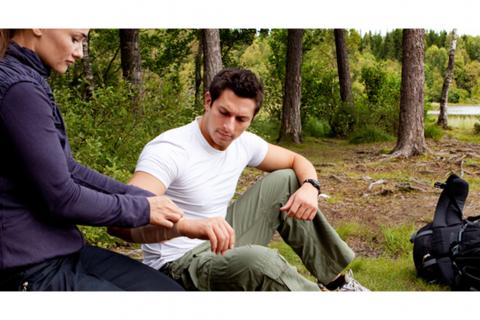
When getting ready for an epic outdoor adventure, it is easy to disregard the first-aid kit. We know testing your GoPro is more exciting than bandages and ointment, but it will not save your life in the wild. Take the time to put together a kit with everything you might need, and you will be all set for safe travels no matter where the open road takes you. Just start with the basics and add to it depending on your adventure.
The Basics
The foundation of every first-aid kit starts with these essentials:
- Tweezers: Come in handy to safely remove ticks, splinters and any other foreign objects that may get lodged in your skin.
- Hydrocortisone cream: Mosquitoes, spiders and other itch-inducing insects are part of the deal when spending time with Mother Nature. Hydrocortisone cream alleviates discomfort and swelling from bugs or irritation-causing plants.
- Gloves and hand sanitizer: If someone gets a cut or a scrape, tending to the wound with clean hands is imperative to prevent an infection. And in a pinch, you can use it to clean the wound.
- Pain reliever: Headache, fever, sore joints can ruin an outing. An over-the-counter pain reliever is a must to prevent physical discomfort.
- Gauze and bandages: For cuts and scrapes, gauze can be used to apply pressure to a wound until bleeding subsides. Adhesive bandages in various sizes are essential for covering wounds and preventing infection.
- Antiseptic wipes: Infections can turn a small wound into a big emergency. Antiseptic wipes can be used to clean a wound properly prior to bandaging it.
- Antibiotic ointment: To help speed the healing process of small cuts and scrapes.
- Allergy relief: Discovering an allergy while camping in the middle of nowhere can quickly turn an adventure into a disaster. Pack general anti-allergy medicine to prevent reactions. If you suffer from severe allergies, we suggest an injectable epinephrine pen for extra precaution.
Fishing
If you are going to be fishing on your trip, add these items to your basic first-aid.
- Cabela's Emergency Hook Remover Kit: Contains everything you need to quickly and safely remove a barbed hook from an individual. Instructions for same method taught in hospital emergency rooms. A must for every tackle kit.
- Alcohol swabs: Cuts, scrapes and open wounds are more likely to get infected while you are fishing, due to the presence of bacteria from fish and water. Stock up on alcohol swabs or other disinfectants to keep wounds free of germs.
Hiking
The promise of serenity and solitude lures backpackers to the road less traveled, but the farther you are from city amenities, the more important it is to plan proactively. Trailblazers, do not leave home without the following:
- Moleskin: Essential for long days on foot, moleskin helps prevent blisters and provides relief from blisters already formed.
- Signaling device: Disorientation on the trail can happen to even the most experienced hikers. If the area is too remote for a cell phone signal, a signaling device - such as a whistle - can help alert rescuers nearby.
- Survival blanket: These lightweight, compact blankets (usually constructed of mylar) could save your life if you get caught in the backcountry overnight in cold temps.
- 1361 views

